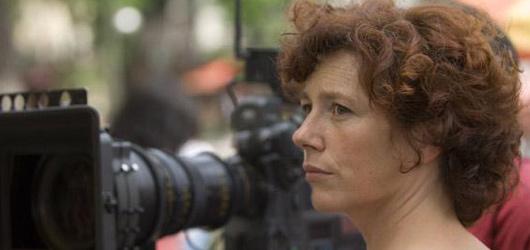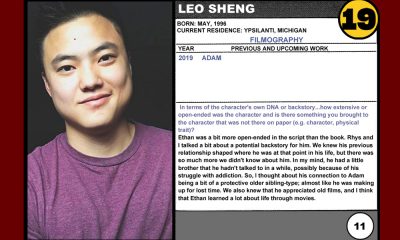Retro IONCINEMA.com
Interview: Iciar Bollain (Even the Rain)
The idea comes from the script writer, Paul Laverty, who first wrote an entire period piece film. Then he decided to bring it to the present somehow, and update it, and he read about and researched this real struggle in Cochabamba in year 2000. To link such two distant events, he got the idea of a film crew, doing this period film in Cochabamba while the riots begun.
Actress and filmmaker Iciar Bollain has had a stellar career in her native Spain, directing powerful dramas such as Hi, are you alone? (1995) Flowers from Another World (1999), and her crowning opus, Te Doy Mis Ojos (2003), which won seven Goya awards including Best Picture.
She returns with Even the Rain, a drama about colonialism in both the past and present. Filmmakers (led by Gael Garcia Bernal and Luis Tosar) head with their crew to a small town in Bolivia to make a movie about the Spanish conquest of Americas. The indigenous townspeople are chosen as extras not only because they look right, but also because they can be used as cheap labor. While this unconscious brand of colonialism is taking place, protests based on the real-life Cochabamba protests in 2000, where the government privatized water, threaten to put the town and the filmmakers in serious danger, and the filmmakers question their own ethics of the story they’re trying to tell. The TIFF 2010 selected film is an emotionally wrought story with an uncomfortable truth, made the shortlist of this year’s Academy Awards as the Spanish entry for Best Foreign Language film, and was just nominated for a record 13 Goya awards.
I spoke with Bollain in December.

Silvestri: How did you get the idea to blend the real-life Cochabamba protests with the story of the filmmaking crew?
Iciar Bollain: The idea comes from the script writer, Paul Laverty, who first wrote an entire period piece film. Then he decided to bring it to the present somehow, and update it, and he read about and researched this real struggle in Cochabamba in year 2000. To link such two distant events, he got the idea of a film crew, doing this period film in Cochabamba while the riots begun.
Silvestri: Sebastian (Bernal) maintains a sort of innocence as the director, believing that he is telling a great story, while his producer Costa (Tosar) has more of a cutthroat agenda. They both go through a deep evolution, learning more about humanity for Costa and reality for Sebastian. Tell me about those characters, and the character development that Paul Laverty, Bernal, and Tosar went through.
Bollain: I guess there is a cross journey, Costa goes in a direction and Sebastian in the opposite one. I found that very attractive about the script, the “moral” journeys of both and thought that was the spine that hold together those three stories the film unfold. I talked about it a lot with Tosar, because is his journey that actually carries us along the film, and we try to find the moments in which he does the changes, little moment of reflection, a look here, a silence there. With Bernal was finding the dramatic moments, like when he breaks down or making the decision of betraying Daniel. Spotting those actors the moments in which that journey was told and stress them.
Silvestri: Carlos Aduviri was very memorable as Daniel, a man who was a warrior in both the film within a film and the protests. Given that he only has two screen credits, I was wondering if he was a professional actor or found at an open call? He was found in an open call.
Bollain: There are not that many actors in Bolivia, and we couldn’t find any with his profile, so we went on an open casting door by door… It was a long process, that took several months till finally Carlos happened to come. He did a number of auditions and we thought, as Gael in the film, he had an amazing face and presence. Working with him was basically helping him to go through the scenes, the lines, to communicate the character as written.

Silvestri: You had worked with Luis Tosar on your film Take My Eyes. He is probably Spain’s most accomplished yet unknown actor. How did you perceive him prior to your first film with him, and has that perception changed?
Bollain: I met him even before Take My Eyes, he did his first film with me Flowers from Another World. He had just done television and it was his first film and he was already very deep, very profound and very true in his performance. Since then I have seen him gaining confidence and experience but never losing his truthfulness. I really believe Luis is the most extraordinary actor.
Silvestri: What was the financing like for this film? How were you able to get support to make the film?
Bollain: It was quite hard to find the finance. The budget is a bit bigger than what you can get within Spain, so producer Juan Gordon had to find it abroad, which with a Spanish-language film is never easy… I think the film looks more expensive than it really is!
Silvestri: Even the Rain had made the shortlist for Best Foreign Language Film at the Oscars. Not only is that a great accolade in addition to Te Doy Mis Ojos‘ seven Goya awards, but you are noted as the first female Spanish film director to be submitted in that category. Is it notable for you, or do you prefer not to be singled out as a woman?
Bollain: I’m always happy to see a woman breaking through since there is so few of us directing. I would really would like to see the day in which it is not an exception or a first time anymore, I would like to see many more films directed, written and produced by women. I think film talks about how life is and how we see it, so it makes all the sense to have every version of it, not just half of it!
Silvestri: What are you working on next?
Bollain: I’m about to do a film in Nepal, about a Spanish teacher [Vicky Sherpa] who went over in the early nineties and tried to teach there and create her own community project. It is inspired by a real woman.
Vitagraph Films releases Even the Rain in theatres this Friday.



























